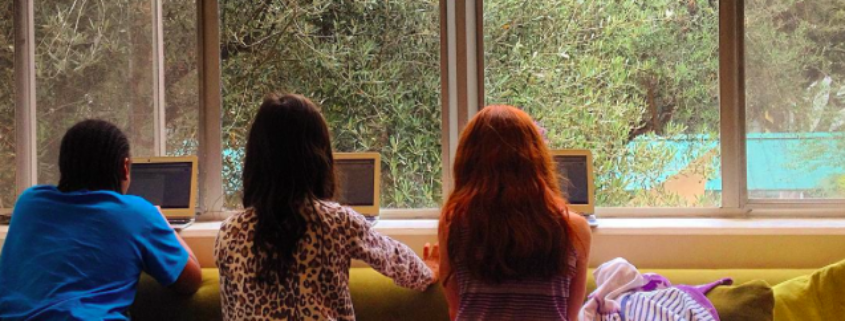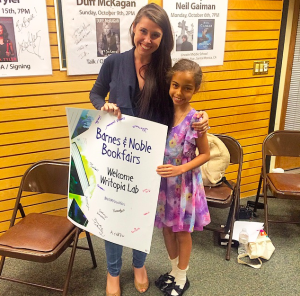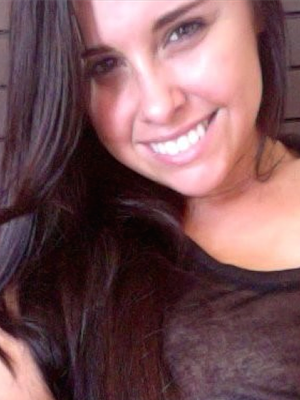A Handy Guide to Losing Your Imagination
“All children are artists. The problem is how to remain an artist once he grows up.”
-Pablo Picasso
On the first day of a weeklong creative writing camp, Joshua, Dylan, and Darcy settled into their seats on the couches. Through introductions I learned that, while Joshua was nine like everyone else, he had skipped to the seventh grade. Last year he learned about outer space and knew the exact number of days it takes to get from Earth to anywhere else in our solar system. He said, irritated, that all he ever writes are essays in class and (no offense, Miss Lyndsay) he does not want to be here. I assured him this wasn’t that kind of class.
I explained the warm-up game: each person will develop a character, and I will interview him or her as that character. I’ll ask questions like: what are your hobbies? Do you have any defining physical traits? If a friend were to describe you, what would he or she say about your personality?
Joshua volunteered to go first. He created a young girl, Lilly, who fit every Hollywood stereotype for misunderstood nerd—straight-A student, shy, duct tape over the bridge of her glasses—but had, for one reason or another, superpowers.
Dylan went last. She hadn’t spoken aside from her introduction, when she couldn’t think of a favorite book or genre she preferred.
“My character is a talking one-year-old baby,” she said, staring at her kneecaps and fidgeting fingers. Before Dylan could say the baby’s name, Joshua interrupted.
“One-year-olds can’t talk, that’s impossible.”
Since taking this job last September, I’ve learned that this moment, when one child polices another child’s imagination, is precisely why Creative Writing Instructor is a necessary job. I am employed to ensure a child’s imagination stays intact, to undo the stigma surrounding wrongness. The rule repeated during every quarterly teaching meeting: No censorship.
“In Dylan’s story, this one-year-old can talk,” I said. “Dylan, tell me about your character’s personality.”
* * *
I’m six when I write my first song. It’s called Baby, and it’s not about anyone in particular; I simply believe all the best songs are love songs. I spend the afternoon writing on Dad’s typewriter, one song and then another, until dinnertime.
* * *
In 2006, Sir Ken Robinson delivered what’s recognized today as the most watched TED presentation, Do Schools Kill Imagination? Around the three-minute mark, Robinson makes this bold statement: “All kids have tremendous talents. And we squander them, pretty ruthlessly… My contention is that creativity now is as important in education as literacy, and we should treat it with the same status.”
He shares an anecdote about a six-year-old girl in art class, who told her teacher that she was drawing God. Her teacher said no one knows what God looks like, to which the girl responded, “They will in a minute.”
Children as young as this girl haven’t yet gained an understanding of right versus wrong in terms of art, and not having that frankly debilitating distinction allows room for creativity.
“If you’re not prepared to be wrong, you’ll never come up with anything original,” Robinson says. “By the time they get to be adults, most kids have lost that capacity. They have become frightened to be wrong. And we run our companies that way—we stigmatize mistakes. And we’re now running national education systems where mistakes are the worst things one can make.”
* * *
I’m eleven, and Dad’s prepared pancakes for the family. My mom and sister haven’t woken up yet, so I’m allowed to stack as many on my plate as I want. It’s nice being Dad’s favorite daughter, I think—okay, fine, maybe he’s never admitted that, but he hasn’t denied it, either.
“Dad, what’s it like being a musician?” I ask. Last night I’d overheard him on the phone saying the recording studio at Dave’s house was ready. I want to be like him when I grow up. As it is, I spend every afternoon locked in my room, serenading the invisible audience sitting on my bed with songs I’ve scribbled in spiral notebooks. I have almost enough material for a demo tape. I hope to use Dad’s recording equipment.
“You know, kid, I’m not like those celebrities you listen to.” Dad bites into his pancakes. Sure, I know he isn’t a fulltime musician; he cleans swimming pools fulltime, wears a daily uniform of basketball shorts and t-shirts, stained and riddled with holes from chlorine splatter. He plays a gig or two a month, usually at the marina just south of our home or at holiday parties. But he’s good. Dad’s really good. “Tell me something. What do you want to be when you grow up?”
“A singer-songwriter. You know that.”
Next to Dad are invoices for his customers, a stack of envelopes, and a roll of stamps. “That’s unrealistic, sweetheart. You aren’t that good.”
“But I’m practicing,” I argue, and softer, soft enough that maybe he doesn’t hear: “I’ll get better.”
“I want you to study hard, go to college, get a good, stable job. I know you like singing and writing, but just don’t bet on that. Okay, kiddo?”
He moves his empty plate aside and starts folding invoices and stuffing them into envelopes. I don’t want him to know I feel disappointed, and slightly embarrassed for believing one day I’d follow in his footsteps, log a few hours in his recording studio. I think of the Grammy acceptance speech I’d rehearsed, memorized. Why keep the songs now? There will never be a demo. When Dad asks me to please wet a paper towel for him, I abide.
* * *
Writopia Lab, a nonprofit devoted to teaching creative writing to children and teens, and the company that generously employs me, opened its doors in 2007 in New York City. Founder Rebecca Wallace-Segall delivered a TEDxYouth talk about why writing creatively—as opposed to writing academically—is important for children, even though it cannot be graded or judged by scholastic standards.
She talked about a student of hers, Theo, who was angry about creative writing assignments in school. Theo recognized that he should be satisfied with a platform that allowed him to be who he really was and do what he loved, but he wasn’t. What Theo meant is this: there is a difference between the writing we create for ourselves and to inspire others, and the writing we do to meet expectations.
In early June I met with the regional manager of Writopia Lab Los Angeles, Jan Edwards. That week I struggled with teaching six high school students. One student refused to write dialogue because it was just too hard. Another spent all of class making plot diagrams, but writing nothing. I was most alarmed when I asked the students to develop characters and three named preexisting ones. When I asked them to create a plot line for these characters, one said, “I mean, you’ve watched The Simpsons, haven’t you? That’s the plot line.”
In every group I teach, there is a wealth of creativity, even if it takes some nudging and encouragement on my part. But I’ve noticed that, starting as early as third grade, students want permission for this creativity. A kid will raise his or her hand: “Miss Lyndsay, can my character be a mouse?”
When I mentioned this to Jan, she said, “Kids stop being encouraged to be imaginative around the same time they start being asked to write essays in school. It results in kids feeling ashamed, even of things they one-hundred percent know the answer to.”
She mentions that this shift happens when kids start telling other kids how one must act, look, and dress. Physical identity, and also imagination, is placed in boxes.
Rebecca’s TEDxYouth talk ends with this: “We learn to write because it feels so good to be understood. We learn to write because it’s so exciting to have a storyline in your mind and to execute it in your vision. We learn to write because it’s cathartic to turn pain into power. We learn to write because we need to.”
* * *
I pack up my laptop after my first day teaching creative writing to a group of fourteen year olds. I’m twenty-five and in awe of my students’ creativity: on the spot, each one developed a fleshed out character and storyline, something I’ve never done successfully in a classroom. I call my mom—a woman who made copies of the song lyrics littering my bedroom floor and saved them for my older self—and ask why no one bothered to enroll me in classes like these.
“Your dad didn’t see the use,” she says. “You know, he was very talented, and no one supported his dreams when he was younger, either.”
* * *
Joshua, Darcy, and Dylan sat around a wooden table drawing book covers for their stories. Joshua wanted to get Lilly’s dress just right, but in his last three attempts, the character’s torso came out either too long or too short. Darcy’s character, a witch, looked like Snow White. Darcy told us she’s beautiful. Isn’t she beautiful?
The Wall Street Journal reported on the importance of imagination in a child’s cognitive development. “Imagination is necessary for learning about people and events we don’t directly experience, such as history or events on the other side of the world. For young kids, it allows them to ponder the future, such as what they want to do when they grow up.”
When Joshua grows up, he said he wanted to be a chemist. He’s good at science. Darcy had a list of no less than eight possible career options, including mermaid. I asked Dylan what she wanted to be.
“An inventor,” she said. “I want to make a time travel machine. The problem is, I don’t know how to do that.”
“You know the best part of being an inventor, Dylan?” I said. “You get to spend your whole career figuring that out.”
Dylan smiled and returned to coloring her book cover. I didn’t tell her maybe that’s unrealistic, maybe study the sciences but in a different field. No. Instead, Dylan got to remain a kid for at least one more day.
Lyndsay Hall lives in Los Angeles where she teaches writing to children and teens. She is pursuing an MFA in Creative Writing at Antioch University and she serves as an editor for Lunch Ticket, Zoetic Press, and Prague Revue. Her essays have appeared in xoJane, Rhizomatic Ideas, and elsewhere.







